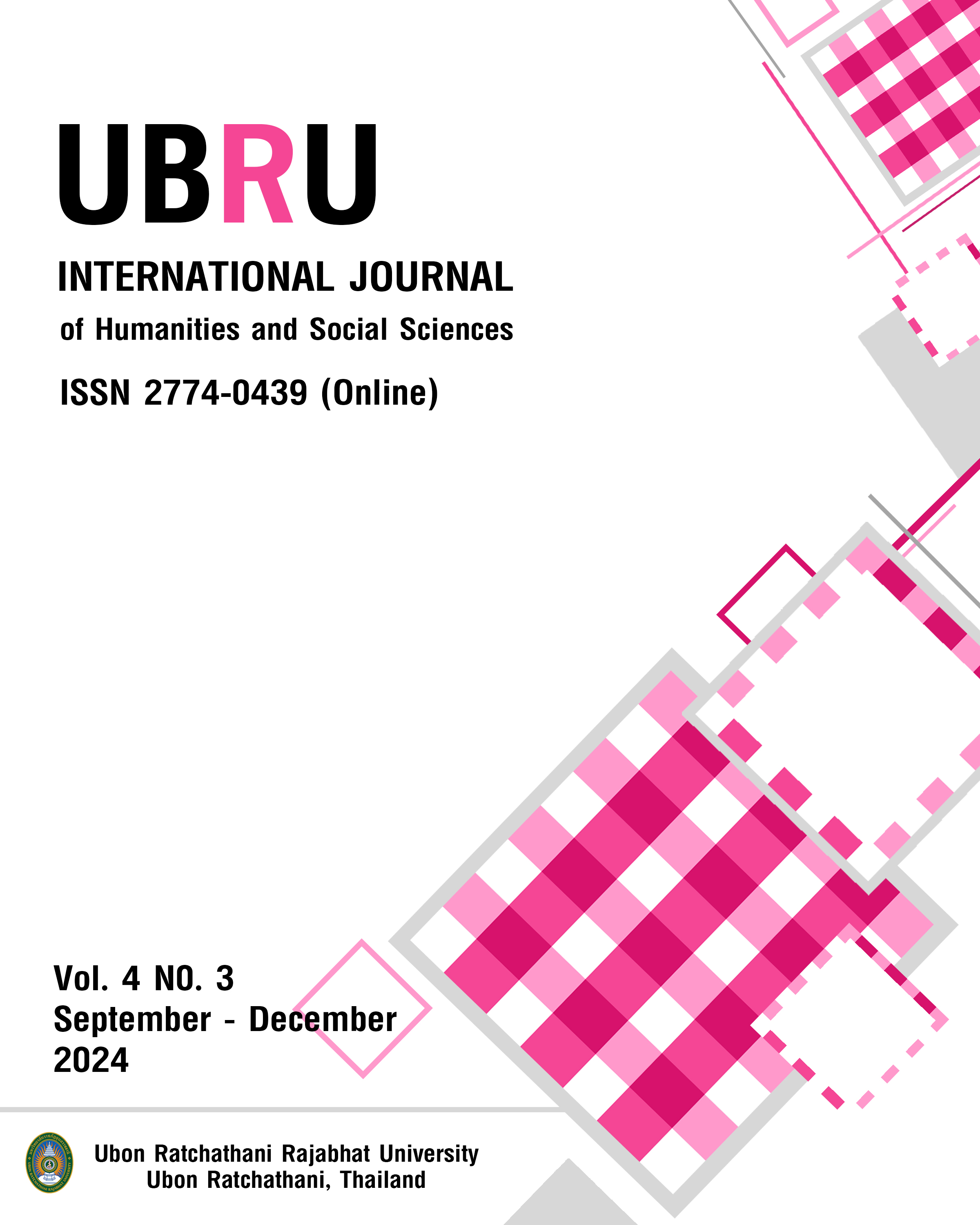Influence of Organizational Culture and Training that Affects Loyalty to The Organization Through Work Incentives for Temporary Employees Under The Jurisdiction of The Amnat Charoen Primary Educational Service Area Office
Main Article Content
Abstract
The objectives of this research are 1. to study the influence of organizational culture, training, and work motivation; that affects temporary employees' loyalty to the organization under the Amnat Charoen primary educational service area office 2. to study the influence of organizational culture and training that affects temporary employees' loyalty to the organization Under the Amnat Charoen primary educational service area office through work motivation 3. to study organizational culture and training that influences work motivation of temporary employees Under the jurisdiction of the Amnat Charoen primary educational service area office classified by district area The sample group used in the research was temporary employees, including temporary employees with a one-year contract and temporary employees. (Government employees) 4 year contract, 400 people, using proportional stratified sampling method. (Proportional Stratified Random Sampling) The tools used were questionnaires.
The results found that 1. organizational culture, training, and work motivation that affects loyalty to the organization Statistically significant at the 0.01 level 2. Organizational culture and training that has an indirect influence on loyalty to the organization through work motivation Statistically significant at the 0.01 level 3) Organizational culture and training
that affects the motivation to work Statistically significant at the 0.01 level.
Article Details
References
Amnat Charoen Primary Education Service Area Office. (2023). Temporary employee information control register: Human resource management group.
Baron, R. M., and Kenny, D. (1986). A “The Moderator–Mediator Variable Distinction in Social Psychological Research: Conceptual, Strategic, and Statistical Considerations,” Journal of Personality and Social Psychology, 51: 1173–1182.
Boonmavong, D. and Tanonkaew, P. (2022). Culture and motivation Thai affects corporate loyalty case study: Thong Suk College. Interdisciplinary Journal of Development, 1(1): 258-263.
Butkhunthong, K. (2016). Factors affecting organizational loyalty of electricity generating authority of Thailand (EGAT) employees. Kasetsart University:1-15.
Chanyanat, J. (2016). Influence of motivational factors towards organizational loyalty and work performance of operational personnel in health science group in an autonomous university. Master of Business Administration thesis. Management field Rajamangala University of Technology Phra Nakhon:10-17.
Chounchob, N. (2017). Factors influencing sustainable organization loyalty: A case study of human resource management division, office of permanent secretary of ministry of public health. extinguishing of independence, Master of Political Science Department of Public Administration and Public Affairs, Faculty of Political Science, Thammasat University:8-15.
Chueram, W. Panyasophon, P. and Sukprasert, C. (2020). “Organizational Culture that Promoting Good Management of the Bureaucracy”. Academic journal Buriram Rajabhat University, 5(2), 185.
Hair, Jr. J. F. et al. Multivariate data analysis. Upper Saddle River, NJ: Pearson. (2010).
Hanphakdeeniyom, A. and Kemtabtim, J. (2018). “Organizational culture of the Thai bureaucracy”. Nakhon Lampang Sangha College Journal, 7(1), 350.
Hoy, W. K. and Rees, R. (1974). “Subordinate loyalty to immediate superiors. A neglected concept in the study of educational administration”. Sociology of education, 47(2), 268-286.
Khuong, M. N. Mai, T. P. Phuong, N. T. M. (2020). “The impacts of human resource management practices on employees ‘motivation and loyalty. International University - Vietnam National University, Ho Chi Minh City, Vietnam”, Management Science Letters, 10(1): 2673–2682. DOI: 10.5267/j.msl.2020.3.025
Liu, W. K. and Lee, Y. S. (2021). “The moderating effects of employee benefits and job burnout among the employee loyalty, corporate culture and employee turnover”. Universal Journal of Management, 9(2): 62-69. DOI: 10.13189/ujm 2021.090205
Mingsamprang, N. (2016). A Study of Organizational Culture, Organizational Commitment and Work Motivation of Employees Influencing Organizational Loyalty in a Thai Commercial Bank, Samut Sakorn Province. Study Master of Business Administration Department of Public Administration Bangkok University:20-29
Phetmoo, S. (2016). Work Motivation, Training Practices and Organizational Culture Influencing Employees’ Loyalty in the Origin Property Limited (Public Company). Independent Study Master of Business Administration Bangkok University:7-16
Phuwichitram, S. Yupas, Y. and Keyaphum, S. (2015). “The Effective Organizational Culture Model”. Nakhon Ratchasima College Journal, 9(1), 73.
Qudah, N. F. A, and Anjum, M. A. (2018). “Transformational training programs and quality orientation of employees: does employees ‘loyalty matter?”, sustainability, 10, 465.
Rungcharoensuksri, S. (2016). A Study of Organizational Commitment, Career Achievement Development and Fringe Benefits Satisfaction Affecting Loyalty of Private Employees Companies in Bangkok Metropolitan Areas. Independent Study, Master of Business Administration Bangkok University:6-13
Sirichotirat, N. (2017). Principles of Human Resource Management in the 21st Century. Bangkok, Chulalongkorn University:8-14
Yusof, H., S. M. Said, N. S. M and Ali, S. S. R. O. (2016). “A study of organizational culture and employee motivation in private sector company”, Journal of applied environmental and biological sciences. Faculty of Business Management, University Technology MARA, Dungun, Terengganu, 6(3), 50-54.
Weerasak Fongnern, Surapong Petchhan, and Rattasit Yajjo. (2018). Application of IoT Technology to Control Smart Farms in Oyster Mushroom Cultivation Greenhouses. Journal of Information Technology and Innovation Management, 5(1), 4-8.


